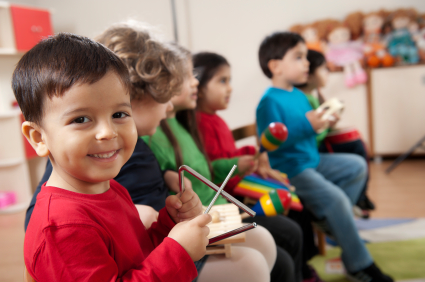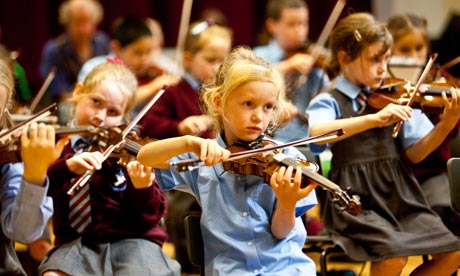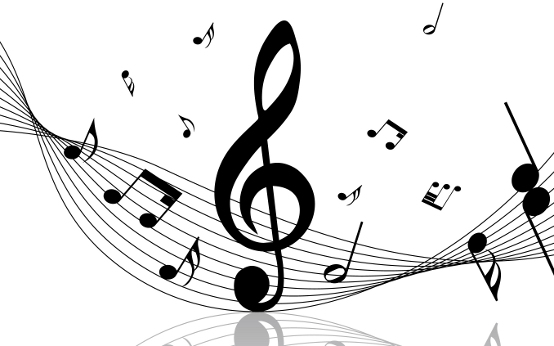The Importance of Music Education
Parents love discussing their opinions on what is lacking in their children’s education. It’s easy to find the faulty corners in the national education system when you’re not the one running it. What’s not so easy, however, is giving intelligent suggestions to try and come up with proactive solutions. For this reason, it’s hard to take anyone’s complaints too seriously, because at the end of the day there’s really not much to be done without a viable alternative.
That being said, it’s time to turn our attention to the arts and their place in education. Many people today feel that children’s horizons are not being expanded enough to experience different activities, which is stunting their overall development. Let’s take music, for example. To put it simply – the “music education” that schools offer today is essentially non-existent. The school devotes little time or energy to music classes, which leads children to believe that this is not a subject that matters. So, why is music education important? And what can we do to make people understand this?
Let’s first discuss the importance of music in education. Musical education has a big effect on the students’ understanding and achievement in non-musical subjects. Although people are not so familiar with this finding, a ten-year study, which tracked over 25,000 middle and high school students, showed that students in music classes got higher scores on standardized tests than students who had little or nothing to do with music. The musically-inclined students scored, on average, sixty-three points higher on the verbal section and forty-four points higher on the math section of the SATs than non-musical students. This is something to take into deep consideration, because when applying to colleges, these points could be the difference between an acceptance letter and a rejection letter.
Although music is important for academic reasons, there are plenty of other reasons that are just as important. For example, participation in music also boasts social benefits for students. Music is an awesome way to make new friends. There has been a recent study dealing with the benefits of music. It was found that participating in ensembles was also perceived as an opportunity to socialize with people who have the same interests, and to make new friends and meet interesting people whom the students might not otherwise have had opportunity to meet. Every time a student is involved in music, he or she has the chance to meet new people and form lasting friendships.
Some people might not think that socializing is a big enough reason to keep music education in school. But there’s another reason why music is so important: teamwork. Kids today are used to doing their own thing, and as a result, they are not developing the proper tools they will need in life when it comes to working together. Being part of any kind of ‘team’ that involves a certain degree of interacting with each other is a big part of character development. The more kids get lost in technology and in spending too much time alone, the more desperately they need to be experiencing different kinds of teamwork. Music as a learning tool is the perfect solution for that.
Even though it has been proven that the benefits of music education are significant, many people tend to argue that it still should not be a legitimate requirement in the curriculum. Their thoughts on the matter is that with the increasing importance placed on standardized testing, there is not enough class time to include music classes. Little do they know; it has been shown that the time students spend in music classes has no negative effect when it comes to academic success. Thus, in reality, having students enroll in music classes would not be detrimental to their academic performance in any way; on the contrary, students would then be able to reap all of the benefits that come with music education.
It could be that in the future, everyone will agree on the importance of music education. However, there is still one major problem. Like a lot of the ‘arts’, there is just not enough funding to keep them going. Funding for schools is typically awarded to traditional academic classes over arts programs. Most schools are spending twenty-nine times more on science than on the arts. Clearly, the current system for the distribution of funds for schools is not acceptable. By transferring some of the funding from traditional academic classes to music classes, the end result for children and young adults could very well be significant. Evidently, although some may try to argue against it, music education should be required in all schools.
Is there a solution here? Who knows… Perhaps if the classes were set up in a different way it would be more appealing to the funders and the children as well. For each age, the class would obviously be set up differently, but the overall lesson or picture would be pretty much the same across the board. What people don’t understand is that teaching children doesn’t have to only be “by the book”; music is something that can very much be part of a “life experience”. Many kids would have an easier time connecting to music than they would to knowledge they have read in textbooks. Have kids form a band and try out different instruments, play musical chairs, and learn the genres of different kinds of music; they can really get into music history and make it fun. There are so many different ways to make music come to life, and at the end of the day, it’s a breath of fresh air after a full day of learning everything “by the book”.
Music education is something that should not be looked at as a joke. When put into the hands of the right person it can be taken to a whole new level. To have music education as a part of the yearly curriculum shouldn’t be a question. If more people knew the beauty and importance of music, the world would be a different place.




No comments yet.